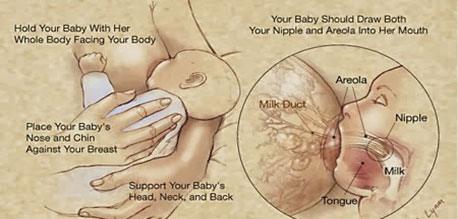Breast Feeding is beneficial for both mother and new born.
Mother’s milk provides vitamins, proteins carbohydrates and other essential nutrients in exact required quantity and that too of tolerable quality to the baby
Benefits to Mother
Changes in Breasts during pregnancy.
What care should be taken?


Mother &baby both should be in comfortable position. Surrounding environment should be quiet & room should be clean. You can breast feed baby in sitting or lying down position also. There is little risk that mother may fall asleep while feeding at night so be alert /or avoid breast feeding in lying down position at night. Stay positive and calm. Mother may need emotional support also.

Avoid giving any other top feeds,it affects breast feeding and baby gets nipple confusion.
१) Milk comes out from other breast while feeding on one breast
This is normal. It may not happen with everyone.
Solution: use bra pads or clean cloth, wash, clean and dry it after use.
२) Pain in Breasts :
Reasons :
Solution:
३) Cracked nipples /soreness /burning sensation over nipples:
Reasons :
Solution:
४) Mastitis
Breasts are very painful, there is redness over skin, fever – consult your doctor
If you need to take any medication for flu, headache, fever etc. tell your doctor that you are breast feeding the baby If taking medicines for any old illness then ask if changes in dose/drug are required as you are breastfeeding the baby, and effects of medicine on milk & baby
These are general guidelines for storing human milk at different temperatures. Various factors (milk volume, room temperature when milk is expressed, temperature fluctuations in the refrigerator and freezer, and cleanliness of the environment) can affect how long human milk can be stored safely.
| Storage Location and Temperatures | |||
| Type of Breast Milk | Countertop 77°F (25°C) or colder (room temperature) | Refrigerator 40°F (4°C) | Freezer 0°F (-18°C) or colder |
| Freshly Expressed or Pumped | Up to 4 Hours | Up to 4 Days | Within 6 months is best Up to 12 months is acceptable |
| Thawed, Previously Frozen | 1-2 Hours | Up to 1 Day (24 hours) |
NEVER refreeze human milk after it has been thawed |
| Leftover from a Feeding (baby did not finish the bottle) |
Use within 2 hours after the baby is finished feeding | ||